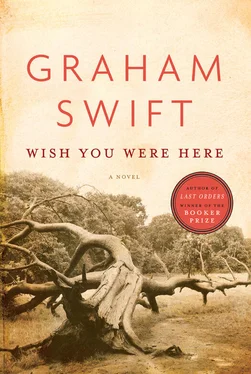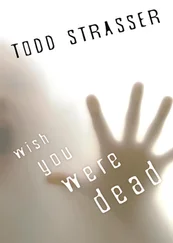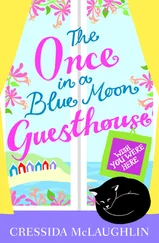So, of all the things he might have said, he’d said that stupid thing. Though he’d said it, he remembered, as if he was truly sorry and as if he was breaking now, to Ellie, a piece of terrible news.
‘I think we’d better cancel St Lucia.’
And Ellie had looked at him as if it might, indeed, have been the worst thing he could possibly have said. And he’d thought again: All those kettles.
LATER THAT MORNING Jack had called the special direct-line number in the letter. How could he not? But he’d had to brace himself to do it and he’d felt, as he spoke, like a man calling a police station to turn himself in.
‘I am Jack Luxton,’ he’d said, like the start of a confession.
And only the next morning, which was also grey, damp and still, a smart black saloon had driven up the winding road from Holn, which Jack surveys now, and after making the climb in a slow, unfamiliarised fashion, had pulled up in the turning-space opposite the cottage. Jack had watched it, from this very window. On a still day any car ascending the hill — it was a rare enough event — would announce its approach, even if you weren’t already waiting. Then he’d watched an army officer get out, reaching as he did so for his peaked cap on the passenger seat and for a brown leather document wallet beneath it.
Jack had been informed of this visit and the timing was spot-on, it was eleven-thirty almost exactly. But when he saw the officer emerge from the car, Jack, who thinks now that Ellie might return in convoy with a squad car, was for a moment in no doubt that the officer had come to arrest him, to take him prisoner or to do whatever army officers were empowered to do. To have him shot, possibly. Yet at the same time, when he’d seen the khaki uniform, he’d had the distinct thought: Tom might have done this. Tom might have driven up one day, out of the blue. He might have turned out, who knows, to have become an officer.
But the officer, whose name was Major Richards — and Jack had spoken to him the preceding day, as requested, on the phone — was in his early fifties and, before he’d put on his cap, Jack could see that his hair was grey and receding and that he looked, in some ways, more like a visiting doctor or some peculiarly burdened schoolmaster than an army officer.
Major Richards had stood for a moment and put his cap on very squarely, pulled his tunic straight and, tucking the wallet under his arm, had coughed into his hand. Then he’d walked the few paces to the front door of Lookout Cottage not quite as if he were marching, but as if ceremony and dignity were not out of place and he knew he might be being watched.
Major Richards had explained, even rather insisted, on the phone that this was how the battalion did things. A personal visit, regardless of how notification had actually been made, to express the battalion’s condolences and sympathies — and loss, and gratitude. And to explain related matters. In the circumstances, nothing less was proper, and he was the appointed visiting officer. So Jack had found himself agreeing to an imminent visitation by the army. He hadn’t consulted Ellie, but he’d said after putting down the phone, and repeating Major Richards’s words almost exactly, that it was how they did things and he’d agreed to it.
So they’d had to tidy up the place — though it was not an inspection — and Ellie had put on something smart and vaguely solemn — she chose her black skirt and pale-grey V-neck with her imitation pearls — to go with Jack’s black trousers and white shirt (things he was never normally seen in), and they’d both prepared to pretend that this was how they always loafed around the cottage on a weekday morning. Ellie had looked at him with a strange, appraising tenderness as they’d dressed in this unusual way. It was like the day they got married. And even as Major Richards strode towards the front door, Jack, having descended the stairs, was on the other side of it, waiting in his crisp white shirt and, in spite of himself, not quite resisting the urge — he’d feel it again in the coming days — to stand to attention.
Major Richards had said, ‘Mr Luxton?’ And had asked very formally if he might come in and, when he did, had removed his cap with a distinct and formal gesture. It had been on his head for just the few steps he’d taken from his car. He’d shaken their hands and at once, while still on his feet, had expressed again, to them both, the battalion’s profound regrets and condolences. He’d said that Corporal Luxton was a brave and exemplary soldier who’d done his duty to the utmost, so that the army was proud of him, and that this was a great blow to everyone.
Jack had lost the immediate sensation of being under arrest or that he was about to have some order barked at him, but he’d felt that, though it was he who’d shown in their visitor and introduced him to his wife, it was more as if Major Richards was greeting them and ushering them into his world. Everything was the wrong way round.
Only when Major Richards had sat down, placing his cap very carefully on another seat close by and the leather wallet on his knees and meanwhile accepting cordially Ellie’s offer of a cup of tea, did the thing relax, if such a thing can relax. With his cap off, he didn’t seem so intimidating.
Looking at them both very attentively, his eyes making regular sweeps between them, Major Richards had reiterated the point about the battalion liking to do things this way. He apologised for the letter’s having reached them by its delayed and roundabout route. He apologised (though it wasn’t his fault) for the need for the letter at all. In most cases, the news, the sad news itself, would be communicated directly, and very quickly, in person. There were what he called ‘army families’. Jack understood that he and Ellie, if they were a family at all, were not an ‘army family’. In other cases, Major Richards had explained, it was only wise to avoid what might be a wasted or impractical initial journey. As to his own journey right now (since Ellie had kindly enquired), it had actually been quite short — not that shortness mattered: Wiltshire, not so far from Salisbury, to the Isle of Wight.
And not such an unpleasant one, Major Richards might have added, if the circumstances had been different. He might have said something complimentary about the really remarkably pleasant situation they had here. The fine view, even on a grey day like today. As he’d parked the car he’d noticed the caravans, in their neat rows, down below.
He’d looked at Jack and Ellie attentively, as if silently confirming permission to proceed, then had unzipped his leather wallet. He’d said that Corporal Luxton had been killed, as stated in the letter, on the fourth of November and at approximately three p.m., local time. It was not possible for him to give many details at this point — he was obviously just a home-based officer — but he could confirm that Corporal Luxton would have died instantly, on active, front-line duty, and that his record was such that he would undoubtedly have been promoted soon to sergeant. He’d been trained as a sniper — had himself been a trainer of snipers — but had been killed when the armoured vehicle he was in had triggered an exceptionally lethal roadside bomb. Two other members of his section had been killed and two wounded, one seriously. It was a very grave incident and a very great loss. These were things, nonetheless, that soldiers in Iraq risked every day.
Major Richards had left a little measured pause, though he did not actually say, ‘Do you have any questions?’ Then, taking out a pen and one of the documents from his wallet, but with an air of being ready to reverse or modify these simple actions if necessary, he’d said that he was sorry to have to ask for such information at such a time, but there were certain matters he needed to confirm.
Читать дальше








![Питер Джеймс - Wish You Were Dead [story]](/books/430350/piter-dzhejms-wish-you-were-dead-story-thumb.webp)



